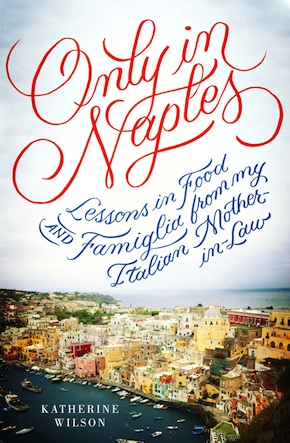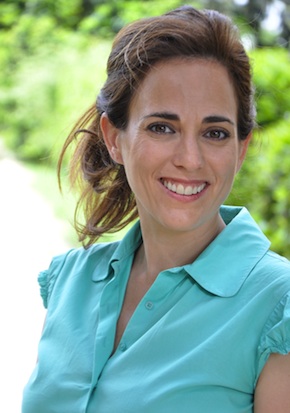Knowing my place
by Katherine Wilson
“A glorious memoir celebrating the holy trinity of Italian life: love, food and family.” Adriana Trigiani
“Ketrin,” my mother-in-law said, “Come over here. You’re good at writing.”
My heart started to beat a little quicker, and I felt beads of sweat popping on the back of my neck. I was ashamed. Why would a simple comment like that invoke such an immediate physical reaction?
We were at Easter lunch in Naples, and my mother-in-law Raffaella had prepared a feast for about twenty people. There was a long, elegant table with a linen tablecloth from the last century and painted Easter eggs. Smells of lamb and baked pasta casserole wafted in from the kitchen. Everyone, it seemed, was busy preparing except me. Whenever I tried to cut the salame or position the crystal glasses, some more experienced Italian kinswoman would come and undo my handiwork, set it right. I gave up. Since we were in Naples at my in-laws’ apartment with my young children, I could always focus on them. Little Lella, let’s go finish that puzzle we were working on, I told my daughter. I’m American, and that excuses me from a lot.
I am also a writer. My memoir, Only in Naples: Lessons in Food and Famiglia from my Italian Mother-in-Law, is about my love affair with this city and this family. When it was published, my husband’s family congratulated me and commented on the jacket design. Brava! they said, and put it on a lovely glass coffee table. Then they changed the subject. Did you try that new risotto recipe we were talking about?
The book was in English, after all, so they couldn’t read and understand it. Plus, there was nothing earth-shattering about publishing a memoir. It took lots of thinking and lots of work, two activities that tend to be frowned on in Neapolitan culture. (In fact, there are all sorts of Neapolitan expressions suggesting that too much thinking can be bad for the health. Think a lot and die young, is one.)
No one had ever referred to me as a writer in the family. I was Ketrin: a mother, aunt, wife, daughter-in-law. What I did in the privacy of my studio – always when the kids were at school, always when the family wasn’t gathered – was tangential to my real identity in the family. What matters in Naples is who you are in the home with the people you love.
Be honest with yourself, Ketrin. You want this person, whom you respect so highly, to acknowledge and celebrate your intellect, your creativity. Insomma, what matters to you.”
So this is why when I heard my mother-in-law say “you’re good at writing” my adrenaline rushed. My identities had always been separate. Now my writer persona was being invited into the dining room, to the place that was central to life in Naples. What kind of importance would it be given? Would my mother-in-law brag to her sister and daughter about what a good writer I was?
I left my daughter to figure out the puzzle and presented myself to my mother-in-law. Here I am, my smile said, the writer. Raffaella was folding place cards and talking a mile a minute with her niece when I approached. “Ketrin!” she said, “Can you write the names on the place cards? You’re so good at writing!”
It must have surprised her when my smile disappeared. She was complimenting me, after all. My grandfather taught me calligraphy when I was little, and I’m pretty good at it. She was right: I’m good at writing. But I felt a wave of disappointment and frustration at her comment. Be honest with yourself, Ketrin. You want this person, whom you respect so highly, to acknowledge and celebrate your intellect, your creativity. Insomma, what matters to you.
I did my best at the name cards, and then we tucked into the scrumptious meal. Aunts, uncles and cousins around the table complimented me on my writing. What a lovely R, and how did you shade the G like that? My mother-in-law was proud. I thanked them, and ate and drank divinely.
Naples is a healthy place for writers like me. It has forced me to realise that writing is simply something I do, like calligraphy. It’s not who I am. The message seems to be: get over yourself, eat some fabulous food, and embrace all kinds of creativity: making a fabulous lamb roast, writing place cards, publishing a memoir. Insomma, there is no hierarchy to creation.
 Katherine Wilson was raised in Washington, DC and educated at the Sidwell Friends School and Princeton University. For the past nineteen years she has worked in theatre, television and film as well as freelance translating in Italy. She lives in Rome with her husband and two children. Only in Naples is published by Fleet in Hardback and eBook. Read more.
Katherine Wilson was raised in Washington, DC and educated at the Sidwell Friends School and Princeton University. For the past nineteen years she has worked in theatre, television and film as well as freelance translating in Italy. She lives in Rome with her husband and two children. Only in Naples is published by Fleet in Hardback and eBook. Read more.

